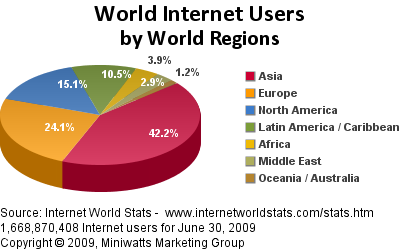People in Canada and the United States have been aware for years that we pay some of the highest prices for some of the slowest internet access in the world. When First World regions like Europe and Japan move to 20 megabit, 50 megabit, and eventually 100 megabit internet access, Canadian and American providers boosted speeds to the 5 to 7 megabit range. While other nations paid roughly $30 per month for speeds up to 20 times faster than ours, we helplessly watched our rates increase to almost $50 per month (2008).
I bring up these statistics for one simple reason: we live in one of the most sophisticated and richest countries in the world, yet we take for granted what a lot of the world does not. Opportunities are limitless around us, yet we do not take advantage of all of the tools given to us. The country's math and science scores are way behind that of the international average. Our technology penetration in our pedagogical efforts are way behind those of other countries, especially Asian schools. The mission statement of One Laptop Per Child is to bring the technology to those that would normally not have access to it to give them better opportunities and help them catch up with the rest of the world. Something that American teachers need to think about is this: Why aren't we making this a huge goal for our own students? I think the newer generations of teachers are working toward this, but we still have a long way to go. We still face the resistance of the "old guard", economic limitations and other prejudices against technology. Just some stuff to ponder on as we work toward making our classrooms more beneficial to our students for a 21st Century Education.
(2009, October 15). World Internet Usage Statistics. Retrieved from http://www.internetworldstats.com/stats.htm
(2008, July 9). Living in a Technology Third World Country. Retrieved from http://www.classicdosgames.com/blog/?p=20
Shepard, W. (2009, May 14). Internet Access in Third World Countries. Retrieved from http://www.vagabondjourney.com/travelhelp/internet-access-in-third-world-countries/

I love my OLPC. I participated in the give-one-get-one program and love the concept. Alas, i'm more than a bit spoiled in my tech expectations and I found the XO to not really fit my needs. I have it proudly displayed in my cube at FS. I wish the program were more successful.
ReplyDelete